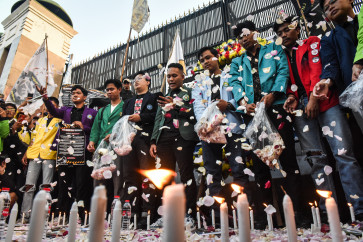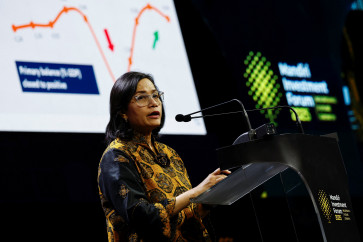Popular Reads
Top Results
Can't find what you're looking for?
View all search resultsPopular Reads
Top Results
Can't find what you're looking for?
View all search resultsIn Tune: The gentrification of cassette culture
VINTAGE GEAR: An operator runs a cassette duplication machine at Lokananta Studio in Surakarta, Central Java
Change text size
Gift Premium Articles
to Anyone
VINTAGE GEAR: An operator runs a cassette duplication machine at Lokananta Studio in Surakarta, Central Java.
In the age of Spotify and iTunes, when millions of songs are available at your fingertips, no one wants to deal with the inconvenience that comes with physical format and other than snobs and purists, the majority of people don’t care a fig if the experience of listening to music should be tactile, immersive or nostalgic.
Last weekend, that small number of people celebrated two of the most important moments of the year. Oct. 8 was International Cassette Store Day (the other big day is Record Store Day, which falls on one of Saturdays in April and celebrates the vinyl format). A Cassette Store Day may sound anachronistic and redundant, as you probably think that with the rise of streaming no one goes to music stores anymore, the cassette format only belongs in the 1980s and the dominance of compact disc (CD) should have rendered it obsolete a long time ago.
But serious music fans tend to be nostalgic, and a large number of them showed up for a Cassette Store Day celebration in several cities. In Bandung and Yogyakarta, music fans indulged in their obsession to the format by holding serious discussions about the merit of cassette tapes, if not waxing nostalgic about the first album they bought in cassette tape format and how it changed their lives. In Jakarta, some music fans did things that usually hardcore vinyl enthusiasts would do on Record Store Day, standing in line to get their hands on some limited copies of albums that have been mostly released on CD a couple of months before.
Some of the most anticipated releases included reissues in cassette tape formats of critically acclaimed indie records like Crimson Eyes from the Bandung-based indie darling Sigmun, Perennial from Jakarta’s dream pop collective Bedchamber and Capital from 1980s-referencing indie band Kaveh Kanes. Also hitting the shelves on last weekend’s Cassette Store Day was Dentum Dansa Bawah Tanah (Underground Dance Noise) a trendy compilation of electronic dance music (EDM), which is all the rage in the capital today, released by the obscure indie label Papaya Records.
The fact that some of Jakarta’s hippest indie bands reissued their music in cassette tape and that a compilation of the trendiest genre in the capital is also released in the format is indeed a cause for celebration. In Indonesia, cassette tapes should be celebrated not only because they survived the onslaught of compact disc and streaming services, but also for their unlikely transformation from a totem of mainstream popular culture to a trendy item that French sociologist Pierre Bourdieu considered parts of “cultural expression”.
In his comprehensive study of Indonesian popular music Modern Noise, Fluid Genres: Popular Music in Indonesia, 1997-2001, American ethnomusicologist Jeremy Wallach gives a detailed description of the popularity of cassette format and that compact discs had never succeeded in reducing its market share. In 1996, there were more than 65 million copies of albums from Indonesian bands and artists being sold, while only 265,000 copies of records sold in compact disc. The figure for Indonesian cassettes was 30 million in 1999 and compact disc 530,000 in 1999. As for the connection between socio-economic status and cultural expression, Wallach found that buyers of compact discs were mostly fans of Western music who live in large cities like Jakarta, Bandung and Surabaya, while those who purchased music in cassette format were mostly music fans in smaller cities who preferred sentimental, melodramatic Indonesian pop or the most popular musical genre in the country, dangdut.
“In the early and mid-1990s, it was not unusual for a ‘dangdut’ cassette containing a hit song to sell more than a million legitimate copies,” Wallach wrote.
Wallach’s study concluded prior to the onset of Napster-pioneered online music piracy, a phenomenon that brought a sea change to the music industry. The ability to get music for free from the internet rendered physical format obsolete and brought record labels to their knees. People stopped buying music in any format, cassette tapes and compact disc in particular. Compact disc suffered the most tragic fate, the format met its demise before it could achieve dominance, the way it had conquered the market in Western countries. In the early aught, record labels stopped releasing music in cassette format, but for those who grew up listening to music in the late 1980s and the early 1990s cassette tapes are the only format they knew.
It was that nostalgia that fueled the resurgence of cassette tapes and for fans of the format to take advantage of the Cassette Store Day celebration — an event first organized by a bunch of technologically challenged music fans in the UK.
“The element of nostalgia is something that I can get the most from the cassette format. I grew up with it,” said Budi Warsito, a music collector who runs the Bandung-based library Kineruku. Although he continues adding vinyl and CD to his collection, Budi said cassette tapes give him the most satisfaction.
“I continue looking for some of the releases that I listened to as a child growing up,” he said.
The runaway nostalgia has recently been a boon for Lokananta, the country’s only operational cassette duplication plant, which saw a rise in work orders in the last four years. While smaller duplication plants shut down their operation and sold their machinery in the late 1990s, Lokananta, who happens to be the biggest music studio in the country, continued operating by manufacturing tapes of Javanese gamelan music that it sold to its network of retailers in and around Surakarta, Central Java.
“We have around 10 job orders in any given month. Mostly from indie bands from Jakarta and Bandung,” said Tamtomo Widhiandono, who is responsible for cassette duplication work in Lokananta.
After more than a decade in the wilderness, those little plastic boxes seem to be on the brink of re-entering the mainstream once again. So dust up your cassette deck and ready your pencil, in case it gets tangle in the gears.










